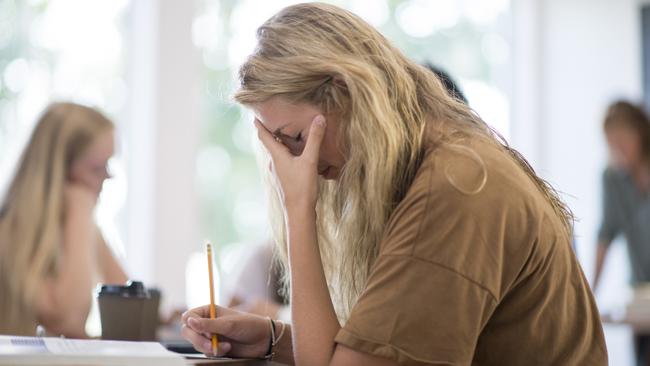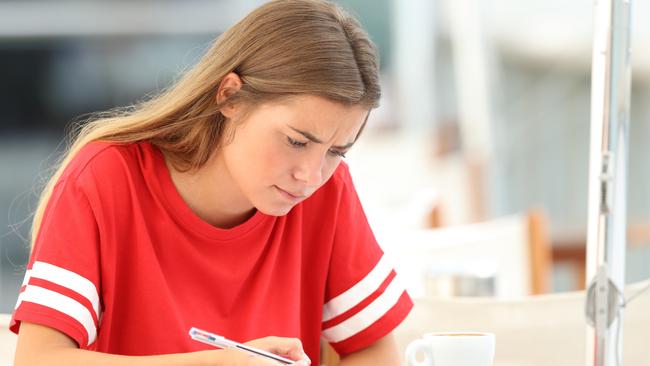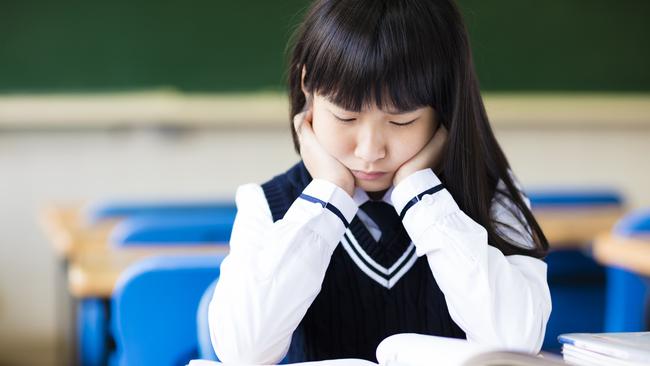Families urged to put mental health of VCE students on the radar
As Year 12 students nervously await their ATAR results and other teenagers move into their senior years of high school, experts have urged parents to be mindful of their children’s mental health.
Education
Don't miss out on the headlines from Education. Followed categories will be added to My News.
Parents have been urged to put their kids’ mental health on their radar during what is regarded as a risky time for students who have finished VCE or are stepping up to senior years.
The end of VCE is seen as a danger time for students who may be uncertain about what pathway they may take or worried that they may not have done well in their exams.
Headspace national manager in schools Kristen Douglas said the ages 13 to 18 are considered a risk for young people experiencing distress, taking their lives, or self harming with many students struggling at the end of the school year.

She said while the routine of school and contact with peers would have got some students through, after the exams are complete young people disconnect from schools making it harder to track potential dangers.
“The schools and families do a good job of containing and supporting and there is the end of two very stressful years at the end of the VCE for some young people,” she said.
“They may have lost their connections, the consistent environment of school, and feel directionless. This places means a greater need for families and friends to open up the lines of communication. Sit alongside that young person.”
For some students it might mean moving away from somewhere that has felt comfortable and safe to a new location or taking on a new challenge.
She said with the ATAR results looming it was important to be open and non-judgmental about available careers, job and pathways and be realistic that it may take a little bit of time to find the right pathway.

However, trying to work out some sort of path, even though it could change, would provide some stability and connection.
Another high risk rate is ages 20 to 25 but there was increasing evidence that the age at which teens were at risk was lowering.
Just weeks until the end of the academic year, students at three Melbourne schools are grappling with news of the suicide of classmates.
The deaths of the students, aged 13 to 15, have left schools and students reeling and a ripple effect through the community.
The schools have sent out letters to families to advise of the incidents and provide direction as to how they can support their children. A crowd-funding campaign has been launched for one of the families.
“Kids are becoming stressed and overwhelmed at a younger age,” she said.
Ms Douglas said the immense overload of information and stress young people were dealing with was likened to taking a sip of water from a fire hydrant.
She said even the step up from Year 9 to Year 10 and from Year 10 to VCE, or alternative options, was creating stress and distress for some young people.
“Kids are projecting themselves into the next year and can get easily overwhelmed by that,” she said.

She said it was important for families to put mental health back on the radar and make it a regular topic at the dinner table.
Ms Douglas said all families needed to embrace a basic understanding of mental health.
“All young people and families need to train, practice and develop the skill of seeking help and receiving help. You don’t learn this by osmosis it needs to be role modelled and talked about,” she said.
She said a lot of families want to keep it in the family and be stoic but people needed to learn to lean in and seek out help early, either through you GP or local services.
Ms Douglas said discussing suicide requires a tenuous balance She said schools receive support to respond in the event of suicide, as it is a very complex space and could ripple through a school community for months and years.
“We think it is important not to share some of the specific information about suicides that may heighten risk because the impact of one suicide can expose others to risk” she said.
“It is a time to promote clear and simple messages about the incident, to promote help seeking pathways, and to look out for and connect with people you may be concerned about,” she said.
MORE NEWS:
STUDY COULD HELP TEENAGER TO SLEEP
HOW TO HELP YOUR CHILD SETTLE INTO HIGH SCHOOL
TRINITY GRAMMAR HAIRCUT PRINCIPAL GETS NEW GIG
Ms Douglas said it was important for families to tune in with each other and encourage downtime so they can recharge.
“Think about yourself as you might your iPhone battery. If you use it and use it you will have zero battery and you will not be able to function,” she said.
She said kids were finding it difficult to sleep and re-energise and recalibrate and there had been a push to mindfulness to try to tackle this.
While these age groups were prone to mood fluctuation, good sleep, diet and exercise were imperative.
WHAT TO DO IF YOU ARE WORRIED ABOUT A YOUNG PERSON
• See a doctor, organise a mental health plan for visits to specialists.
• Access beyondblue.org.au online or call 1300 22 46 36 anytime.
• headspace.org.au or call 1800 650 890
• Lifeline on 13 11 14.
• Kids helpline on 1800 551 800.
• If you are concerned take them to a hospital emergency department.
• If you fear they will hurt themselves call police 000 immediately.
